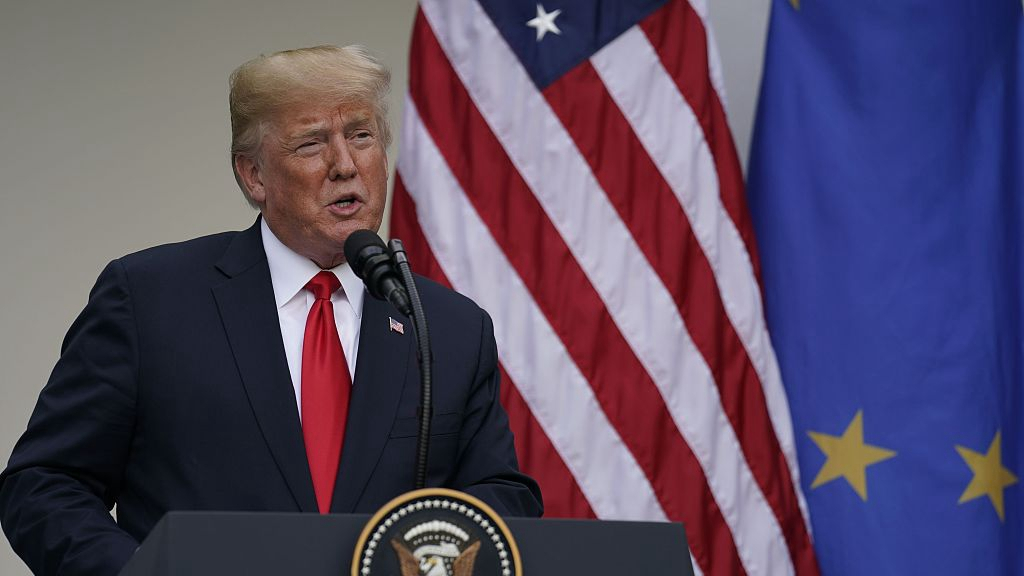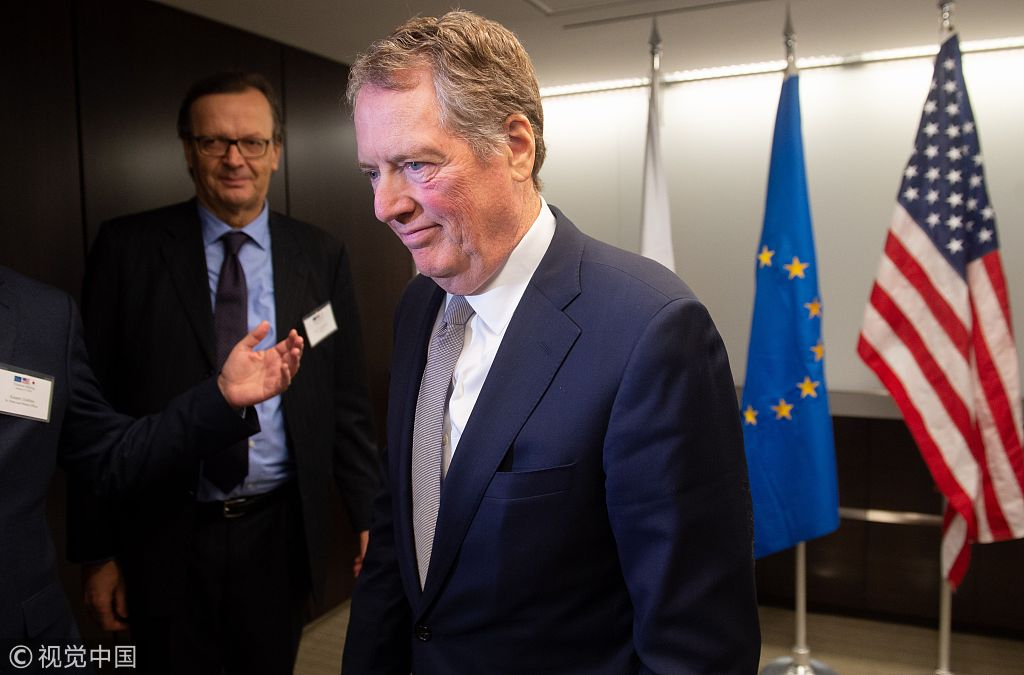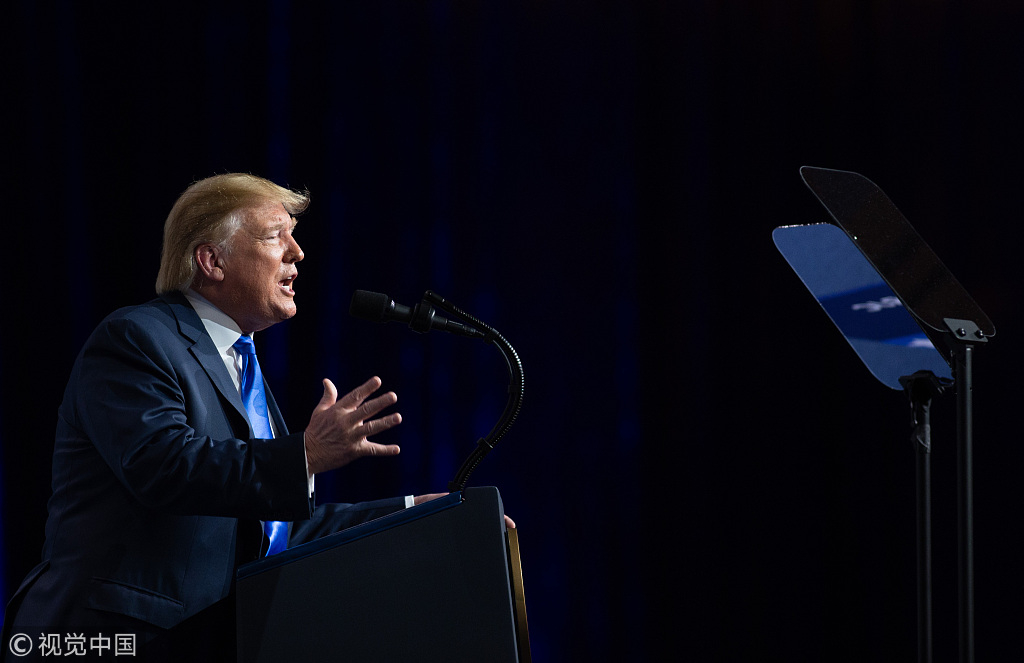
Opinion
13:48, 10-Apr-2019
Trump’s trade war turns on Europe
Tom Fowdy

Editor's note: Tom Fowdy is a British political and international relations analyst and a graduate of Durham and Oxford universities. He writes on topics pertaining to China, the DPRK, Britain, and the U.S. The article reflects the author's opinion, and not necessarily the views of CGTN.
On Tuesday night, Donald Trump opened up a new front in his global trade war efforts – that is, in Europe. Complaining about European Union subsidies for the aviation manufacturer Airbus, the president took to Twitter and announced he will slap 11 billion U.S. dollars' worth of tariffs on the continent over the dispute, taunting that “the EU has taken advantage of the U.S. on trade for many years. It will soon stop!”
International markets reacted negatively to the announcement. But for all who have been following the Trump administration's actions closely, this is no surprise.
The presidency has long had it in for Europe. Striving to force American interests upon the bloc, Trump has abandoned trans-Atlantic multilateralism in favor of “America First” unilateralism. Thus from the beginning, he has threatened the continent with tariffs, demands for greater NATO cost sharing and even threats to abandon the alliance altogether.
Now that the trade war with China is coming to an end and a deal is close, Trump is undergoing his textbook style of switching from one front to the next by waging a trade war on Europe. In each instance, the goal of the administration is to force the rest of the world, including allies, into a U.S. unilateral economic order. The bloc, however, will be more than armed and ready to fight back.
Trump's scuffle with Europe isn't new. The president has attacked the continent in ways that none of his predecessors has ever dreamed of doing. From the very beginning, he has signaled a willingness to force concessions from the EU on matters of trade, complaining primarily about steel, automobiles and Airbus. What exactly is his problem with it?
The European Union advocates the doctrine of a “single common market.” That is a closed and exclusive trading bloc that promotes the economic interests of European states, primarily the “big guns” of Germany and France.

U.S. Trade Representative Robert Lighthizer arrives for a trade meeting with EU Trade Commissioner Cecilia Malmstrom at the offices of the EU delegation in Washington, DC, January 9, 2019. /VCG Photo
U.S. Trade Representative Robert Lighthizer arrives for a trade meeting with EU Trade Commissioner Cecilia Malmstrom at the offices of the EU delegation in Washington, DC, January 9, 2019. /VCG Photo
European policy is to subsidize key continental industries to give them a cutting edge advantage on the playing field of the continent itself and close out the room for foreign competitors. Airbus, a Netherlands-based aviation manufacturer, is a key example of such, with EU policies giving the engineering firm an upper hand over U.S.-based Boeing.
As a result, the administration has spent two years threatening Europe with various tariffs and measures. However, as Trump tends to do, he does not strike until the political timing is just right; carefully shifting the agenda from one foreign policy issue to the next in a surprisingly calculated and strategic way.
Hence in 2018, as trend tensions with Beijing escalated, the administration notably signed a “trade truce” with EU Commission President Jean Claude Juncker to forfeit tariffs for the time being. The move was largely seen as a strategic impasse so America could first turn full throttle against China.
Now, the context has changed and timing is right. The U.S. and China are reportedly very close to a deal which will bring an end to the trade conflict. Seeing the end of that front in sight, he is now ready to shift the agenda and open up another one: the “truce” is clearly over and the gloves are off.
By using Twitter and thus going public, the president is thus forcibly setting the agenda. His goal is to aggressively confront the bloc and force it to tear up some of its protectionist common market policies, granting the U.S. one-sided and unilateral market access. The proposed U.S.-EU trade agreement, The Transatlantic Trade and Investment Partnership (TTIP), long disregarded, was too equal for his liking.
Given this, all of these trade war efforts by Trump must be viewed in the bigger picture – that is, his bid to create a U.S.-centric “America First” economic order on strictly unilateral grounds. The president has attacked every single trade agreement the U.S. is a partner to in a bid to do this.

U.S. President Donald Trump speaks during the Republican Jewish Coalition 2019 Annual Leadership Meeting in Las Vegas, Nevada, April 6, 2019. /VCG Photo
U.S. President Donald Trump speaks during the Republican Jewish Coalition 2019 Annual Leadership Meeting in Las Vegas, Nevada, April 6, 2019. /VCG Photo
In each effort, he has sought to remove the competitive advantages of other parties in each case and create an alignment which strictly favors the U.S. It is an attempt at establishing a padlocked American economic hegemony over the world with everything geared towards serving the singular interest of Washington, and thus subsequently dictating the terms.
In doing so, the president is destroying the very multilateral liberal trading order that his country established in the first place. No longer is trade a means of moral excellence with the U.S., believing strongly in the spread of its own prosperity and way of life, but it is instead a weapon of geopolitics and naked self-interest.
But who knows which way it will go. Europe is good at uniting to protect their economic interests as a bloc. If the United States challenges them with a trade war, they will hit back and hold their own.
Trump is picking a fight with the largest trading bloc in the world, one which exceeds the size of the United States and consists of a coalition of some of the planet's largest and wealthiest economies. In any scenario, however, the price that transatlantic prosperity will ultimately pay is huge.
(If you want to contribute and have specific expertise, please contact us at opinions@cgtn.com.)

SITEMAP
Copyright © 2018 CGTN. Beijing ICP prepared NO.16065310-3
Copyright © 2018 CGTN. Beijing ICP prepared NO.16065310-3